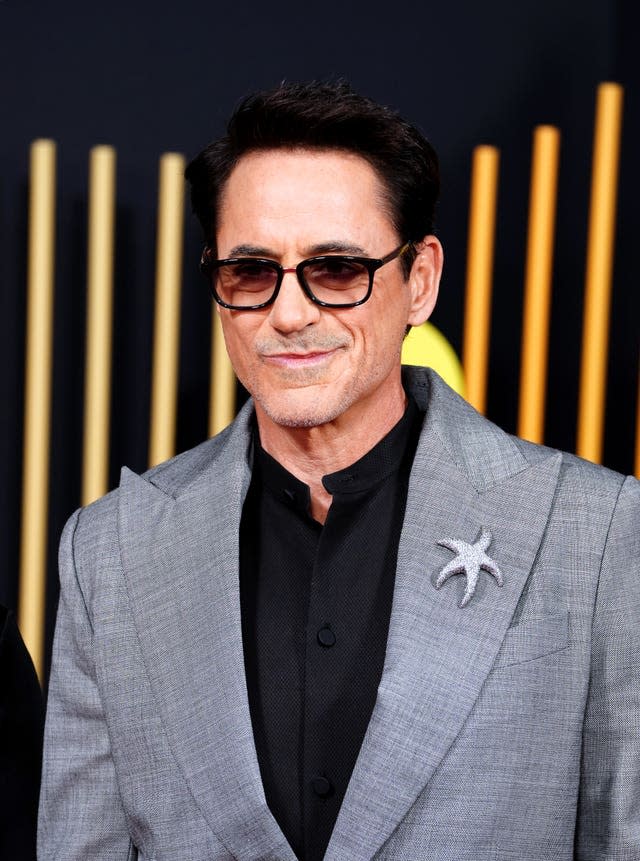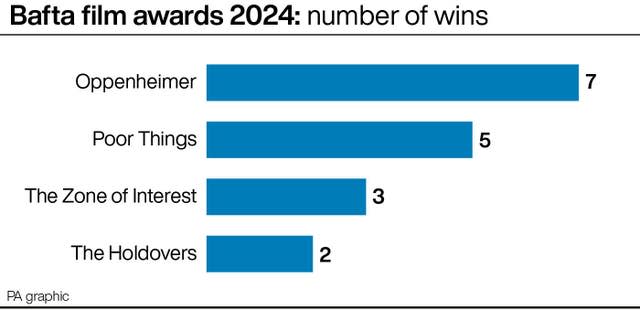2024 Bafta film awards delivers string of historic firsts
This year’s Bafta film awards delivered a string of historic firsts.
Robert Downey Jr set a new record for the longest gap between wins by an actor.
His award for best supporting actor, for his role as Lewis Strauss in the biographical drama Oppenheimer, came 31 years after his previous Bafta in 1993, for the film Chaplin.
The previous record was 27 years, set by Sir Anthony Hopkins in 2021 when he won the award for best actor for The Father, nearly three decades after his 1994 win for Shadowlands.

History was also made with the award for best animation, which went to The Boy And The Heron – the first time a Japanese film has won this category.
It was third time lucky for British filmmaker Christopher Nolan.
He was first nominated for a Bafta back in 2011, for the film Inception, but failed to win.
The same happened in 2018, when he was nominated for Dunkirk, but again walked away with nothing.
This year he finally triumphed, being named best director for Oppenheimer.

Nolan’s film was responsible for another Bafta first.
Cillian Murphy, who played the title role of J Robert Oppenheimer – the American physicist who helped develop the atomic bomb, was named best actor, the first ever Irish winner of this award.
Da’Vine Joy Randolph was the only non-white winner in any of the acting categories, taking best supporting actress for her role in The Holdovers.
Her success bolsters the reputation of this category for being the most diverse of all the acting Baftas, with four of the last 10 winners coming from an ethnic minority background.

By contrast, the wait goes on for the first ever non-white winner of the Bafta for best actress.
Of the all the acting categories at the awards, it is the only one never to have been won by somebody from an ethnic minority background.
There were six people nominated in the category this year, two of whom were non-white: Fantasia Barrino (for The Color Purple) and Vivian Oparah (Rye Lane).
The award went to Emma Stone for her performance in Poor Things.

Another missed opportunity for a historic moment came with the award for best editing, where Thelma Schoonmaker stood a chance of becoming the first person to win it three times.
She had been nominated this year for Killers Of The Flower Moon, having won previously for Raging Bull in 1982 and Goodfellas in 1991, all films directed by her long-time collaborator Martin Scorsese.
The award instead went to fellow American editor Susan Shopmaker, for her work on The Holdovers.

Oppenheimer’s total number of Bafta wins, seven, was just two short of equalling the all-time record of nine, set by Butch Cassidy And The Sundance Kid in 1971.
Both Oppenheimer (13 nominations) and Poor Things (11) had a chance to equal or beat this record, while Killers Of The Flower Moon (nine nominations) and The Zone Of Interest (nine) had a chance to draw level.
In the event all fell short, with Oppenheimer getting seven awards, Poor Things five, The Zone Of Interest three and Killers Of The Flower Moon none at all.

 Yahoo Movies
Yahoo Movies 
